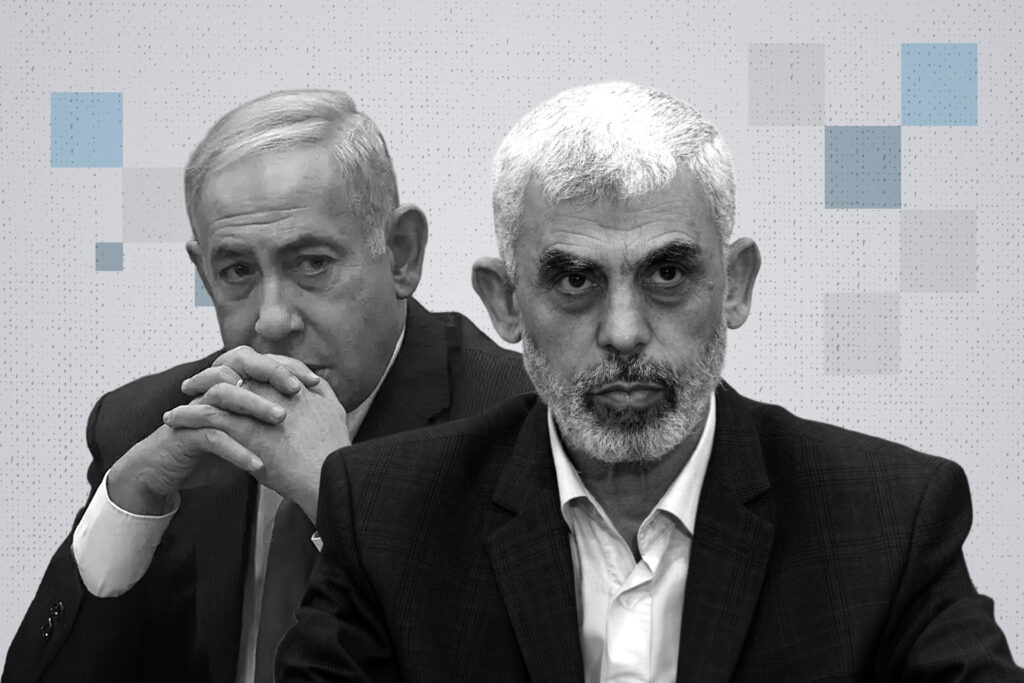The missing strategy
In his first statement after the assassination of Sinwar, Netanyahu was not in a rush, and kept his options open, saying that “the war is not over,” indicating that reaching Sinwar and assassinating him represented a success for his strategy in the face of the pressures that were being placed on him, according to his assessment.
Although the assassination of Sinwar and arriving at his location was a coincidence, according to what became clear from Israeli information, Netanyahu said, “Now it has become clear to everyone, in Israel and in the world, why we insisted on not stopping the war… and why we insisted, despite all the pressure, on entering Rafah, where Sinwar was killed.” “.
In his statements, Netanyahu did not send a “reassuring” signal to his American ally, who is also looking for an “image of victory” to use in the fierce presidential election battle, nor to Israeli public opinion or the families of the detainees, which indicates that he lacks an exit strategy from the war, given the difficulty and ambiguity of the concept of “victory.” “the absolute” that he seeks.
In this context, writer and political analyst Alon Pinkas says in the Israeli newspaper Haaretz (October 18 issue) that it is ironic that the long-awaited killing of Sinwar “reveals the absence of any coherent Israeli political plan or ideas for the post-war phase in Gaza.”
Pinkas believes that, “For this reason, the war will not end any time soon unless there is a mass surrender by Hamas in the coming days and weeks,” which was not implementable and will not be so, as Hamas, in the words of Khalil al-Hayya, a member of the Political Bureau and its late vice-president, confirmed. Continuing its military and political constants.
Al-Hayya said, mourning Al-Sinwar, “We say to those who are crying over the occupation’s prisoners held by the resistance that these prisoners will not return to you unless the aggression against our people in Gaza is stopped, the complete withdrawal from it is completed, and the heroic prisoners are released from the occupation’s prisons.”
Netanyahu explains Sinwar’s departure as a new pressure card he gained against Hamas – as well as the international community – that may bring him more tactical achievements within his vision of what he calls the “New Middle East”, which he wants to shape with an excess of propensity for war, and drop all truce initiatives.
Sinwar’s martyrdom came days after the occupation army launched a large-scale operation in the Jabalia camp in the northern Gaza Strip as part of what is known as the “generals’ plan,” which aims to evacuate the northern Gaza Strip of its residents and establish a permanent security belt in preparation for the resumption of settlement and a practical return to the situation that existed before 2005. .
Sinwar’s martyrdom also comes with the escalation of the Israeli war on Lebanon and the attempts of a ground incursion into its south, where the Israeli aims shifted from returning the settlers of the north, to occupying a depth of 10 kilometers inside Lebanese territory, and then changing the balances in the entire Middle East and creating a new strategic situation.
Netanyahu’s policies in Gaza, in which he is likely to not agree to any ceasefire, can therefore be understood within the arrangements he wants for the region as a whole, taking advantage of the tactical achievements he has achieved, and ignoring the losses Israel has incurred in a long, unprecedented war.
Netanyahu does not separate what is happening in Gaza from the preparations to launch a military strike against Iran, in response to the Iranian missile attack on Israel on October 1.
According to the American Wall Street Journal, the decision that Netanyahu may take, whether to stop the war or continue it, which is likely, according to its assessment, “will depend on the fate of the broader war in the Middle East, the fate of the hostages, the fate of the tense relations between Israel and the world, and the fate of Netanyahu.” same”. This is what Netanyahu takes into account more than others.

